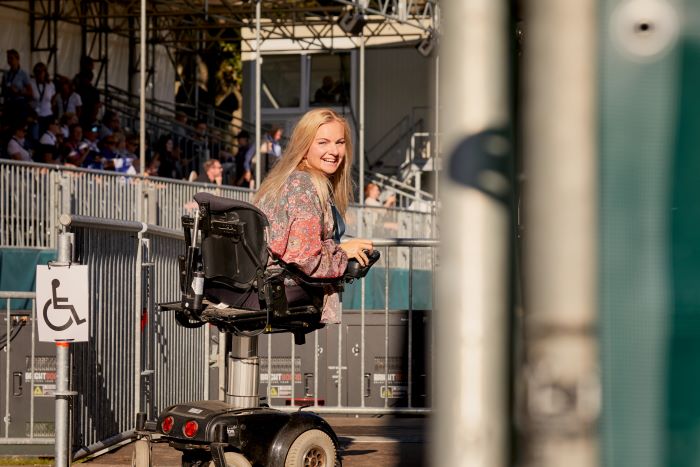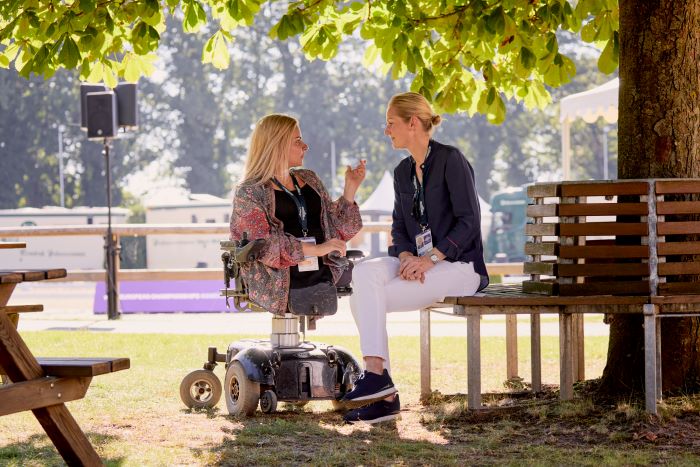 Campus
Campus
Accommodating accessibility is often an afterthought in the planning of a sport event. But the Organising Committee of the FEI Dressage and Para Dressage European Championships here in Riesenbeck (GER) have ensured that everyone in attendance has an opportunity to participate fully in all aspects of the Championships, regardless of their disability.
In order to create a welcoming environment for all, accessibility considerations have been included in all aspects of the organisation of this week-long event which will host athletes, staff and spectators with different disabilities and mobility requirements.
Based on the learnings and good practices of the FEI World Championships in Herning (DEN) and Pratoni (ITA) in 2022, the Championships in Riesenbeck are the first to be organised in line with the requirements set out in the FEI Accessibility Handbook for Event Organisers
Relevant links:
Para Equestrian Digest: Ferdinando Acerbi
FEI launches Accessibility Guide for Event Organisers
This handbook, which is the result of consultation and collaboration with accessibility experts, individuals with disabilities and professionals in the equestrian industry, covers venue layout, accommodation and transportation among other areas of Event planning and delivery.
It is an advancement that has made Denmark’s former Para Dressage World Champion Stinna Tange extremely happy.

“The level of consideration and the attention given to accessibility and inclusion here in Riesenbeck has impressed me greatly,” said Stinna who has assisted the Organising Committee with their accessibility planning and is also the FEI Para Dressage sports reporter for the Championships.
“As a wheelchair user, it has been an absolute pleasure to be able to move around the venue as freely as any abled bodied person, and this should be the goal of accessibility of any and all equestrian events, regardless of the discipline.
“The FEI Handbook has been thoroughly studied and implemented by the Organisers here in Riesenbeck and I applaud the level of consideration and the seriousness with which the organisers have approached the job of assuring accessibility and inclusion at the venue.
Tools like this that result in a more inclusive event site are important to ensuring that wheelchair users like myself feel included and part of the action.”
In preparation for the Championships, the Organising Committee carried out an extensive outreach process where they contacted individual national federations to understand the specific accommodation requirements of their athletes.
“We wanted to create an Event where everyone feels welcome and comfortable regardless of whether they are a participant or a spectator,” said the Event Manager for the Organising Committee, Verena Gravemeier who has played a front and centre role in Riesenbeck’s accessibility journey.

“But sometimes it is difficult to know where to start and how to effectively address all the different types of disabilities. Moreover, as an able-bodied person, it can be hard to understand, or even see, the barriers that a person in a wheelchair can experience, for example. And even if you do see the problem, the solution may not always be obvious.
“So, we were fortunate to have Stinna’s assistance in the lead up to the Championships and together we worked to enhance all areas of our operations and we are extremely pleased with the feedback we’ve been receiving. Bringing Stinna into the planning process earlier rather than later, allowed us to resolve many issues before the Championships started, and in many areas the solutions were simple enough to implement.
“Once you start thinking about accessibility in terms of your end result, it is just a matter of time before you find yourself anticipating the various disability needs and requirements that need to be implemented in the Event planning process. We hope that our experiences here will help to build on the guidelines already provided in the handbook, which Organisers of future equestrian Events can also put into practice.”
North Rhine-Westphalia’s State Secretary for Sport and Volunteerism Andrea Milz summed it up well when she said, "If you are attending the FEI Para Dressage European Championship here in Riesenbeck you will see why this beautiful facility has been praised by the athletes, trainers and all visitors.
“The excellent venue construction and organisation should become a blueprint for future events, and we hope that other organisers will continue to treat Dressage and Para Dressage equally in all matters of operations. This way athletes with disabilities will also have the same opportunities as their able-bodied colleagues to take part in more top equestrian events."
Editor notes
The FEI was one of the first international sports governing bodies to govern and regulate global para sport alongside its able-bodied disciplines when Para Dressage joined its ranks in 2006. The Para Equestrian Committee was created in 2006 when the governance of Para Equestrian passed from the International Paralympic Committee (IPC) to the FEI.
Over the years, there has been more integration of Para Equestrian sport into the FEI Governance and World Championship structures, which has raised the profile of Para Sport alongside the FEI’s other disciplines.
At the 2020 FEI General Assembly, the Chair of the FEI Para Equestrian Committee became a voting member on the FEI Board, ensuring that Para Sports has a place at the top table’s discussions alongside able-bodied disciplines.
Other governance related initiatives included in the FEI’s host bidding requirements, require world and continental championships for para athletes and able-bodied athletes to be held at the same venue.
The FEI Solidarity and Para Dressage Departments have worked together to create the FEI Para Dressage World Challenge series, a development programme in place since 1 January 2023. The Series aims to give athletes, who are unable to participate in international events due to financial or geographical reasons, the opportunity to compete in events in their own country. These competitions are in place to help National Federations develop Para Dressage, and close the gap between National and first level international competitions.
While these top-down initiatives have been important to the development of Para Equestrian within the FEI’s structures, it has also had a positive impact on the general attitudes towards disability and inclusion within the equestrian community more generally.
The FEI’s online Para Sport magazine – The Para Equestrian Digest – launched in February 2022 was created for Para Equestrian athletes and the people connected to the sport so they can share – in their own words – their personal experiences and disability stories. The Digest puts the spotlight on an athlete or project in Para Equestrian sport with the aim of increasing visibility for the sport and improving disability awareness and inclusion.
Photo credit: FEI/Liz Gregg
We use cookies on this site to enhance your user experience.
By clicking any link on this page you are giving your consent for us to set cookies.